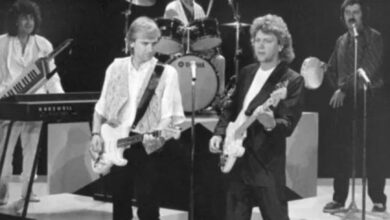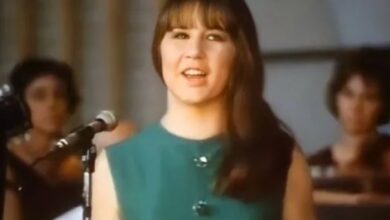The emotional resonance and beauty of this Elvis Presley song are difficult to express
Elvis Presley’s rendition of “You’ll Never Walk Alone” stands as a poignant example of his versatility and emotional depth as a vocalist. Originally a show tune from Rodgers and Hammerstein’s 1945 musical “Carousel,” the song transcended its theatrical origins to become a timeless anthem of resilience and hope. Presley’s interpretation, steeped in his gospel roots, imbues the song with a profound sense of faith and reassurance.
Known primarily as the “King of Rock and Roll,” Elvis Presley’s music spanned a wide spectrum of genres, including rockabilly, blues, country, and gospel. His gospel recordings, in particular, reflected his deep-rooted spiritual beliefs and his upbringing in the church. “You’ll Never Walk Alone” resonated deeply with Presley, allowing him to showcase not only his vocal prowess but also his ability to connect with the spiritual and emotional core of a song.
In his rendition, Presley’s deep, rich voice resonates with warmth and sincerity, conveying a message of steadfast faith and enduring strength. The backing choir, a staple of many of his gospel recordings, enhances the song’s message of unity and support, creating a powerful sonic backdrop that complements Presley’s lead vocals perfectly. Together, they create a lush, uplifting sound that envelops listeners and inspires a sense of hope.
Beyond its musical qualities, “You’ll Never Walk Alone” carries a timeless message of perseverance in the face of adversity. The lyrics, which speak of walking through storms and finding courage in difficult times, have universal appeal. Regardless of listeners’ backgrounds or beliefs, the song’s message of resilience strikes a chord, offering solace and encouragement in moments of doubt or hardship.
Elvis Presley’s career was marked by numerous achievements and milestones. Born on January 8, 1935, in Tupelo, Mississippi, he emerged as a cultural phenomenon in the 1950s, revolutionizing popular music with his charismatic persona and electrifying performances. His early recordings at Sun Records, including hits like “That’s All Right” and “Blue Moon of Kentucky,” established him as a pioneer of rockabilly—a fusion of country music and rhythm and blues that laid the groundwork for rock ‘n’ roll.
As Presley’s career progressed, he transitioned into acting, starring in a series of successful films throughout the 1960s. Despite his film commitments, music remained at the heart of his artistic expression. His gospel recordings, in particular, held a special place in his catalog, reflecting his deep-seated faith and personal connection to spiritual music.
“You’ll Never Walk Alone” was recorded by Presley during his sessions at RCA Studios in Nashville, Tennessee. The recording process captured the essence of Presley’s live performances, where he often drew inspiration from gospel music’s emotional depth and fervor. His rendition of the song exemplifies his ability to infuse popular music with spiritual themes, bridging the gap between secular and sacred in a way that resonated with audiences worldwide.
Elvis Presley’s legacy extends far beyond his musical achievements. He became a cultural icon, influencing fashion, film, and popular culture at large. His impact on music remains unparalleled, with his recordings continuing to inspire and resonate with listeners of all ages. Despite his untimely death on August 16, 1977, Presley’s music lives on as a testament to his enduring legacy and his ability to touch hearts with his soulful voice and timeless interpretations.
In conclusion, Elvis Presley’s rendition of “You’ll Never Walk Alone” encapsulates the essence of his artistry and his ability to convey profound emotions through music. His deep connection to gospel music, combined with his innate vocal talent, brought new meaning to the song, transforming it into a beacon of hope and inspiration. As listeners continue to discover and rediscover Presley’s music, his rendition of “You’ll Never Walk Alone” remains a powerful reminder of the enduring power of faith, resilience, and the human spirit.





